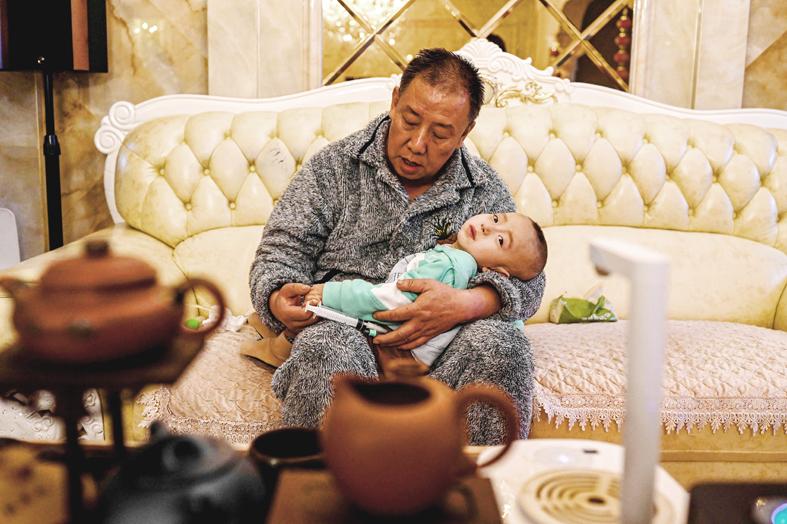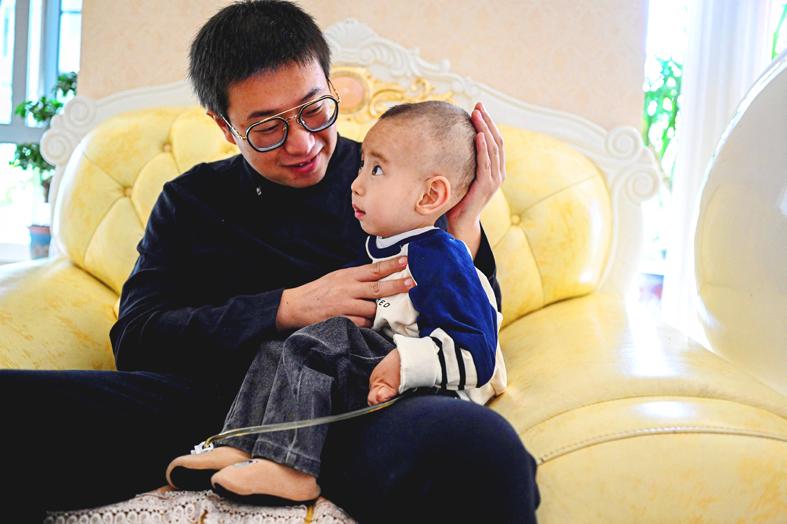Two-year-old Xu Haoyang (徐灝洋) has likely just months to live — but the only medicine that can help his rare genetic condition is not found anywhere in China and closed borders due to the COVID-19 pandemic mean that he cannot travel for treatment.
Instead, his desperate father, Xu Wei (徐偉), has created a home laboratory to create a remedy for the boy himself.
“I didn’t really have time to think about whether to do it or not. It had to be done,” the 30-year-old said from his DIY lab in an apartment building in southwestern Kunming.

Photo: AFP
Haoyang has Menkes syndrome, a genetic disorder that affects how copper — which is crucial for brain and nervous system development — is processed in the body. Those with the syndrome rarely survive beyond the age of three.
However, Xu, who has only a high-school education and ran a small online business before his son became ill, is determined to give him a fighting chance.
“Even though he cannot move or speak, he has a soul and feels emotions,” he said, holding Haoyang in his lap to give him a drink of honey mixed with water.

Photo: AFP
After being told the disease was incurable and the only medication that could help ease symptoms was not available in China, he began researching and teaching himself pharmaceuticals.
Most online documents on Menkes syndrome are in English, but Xu used translation software to understand them, before setting up a home lab in his father’s gym.
On discovering that copper histadine could help, he set up the equipment to create it himself, mixing copper chloride dihydrate with histidine, sodium hydroxide and water.
Now, Xu gives Haoyang a daily dose of homemade medicine, which gives the child some of the copper his body is missing.
The amateur chemist said that a few of the blood tests returned to normal two weeks after beginning the treatment.
The toddler cannot talk, but he gives a smile of recognition when his father runs a gentle hand over his head. His wife, who did not want to give her name, cares for their five-year-old daughter in another part of the city.
Menkes syndrome is more prevalent in boys than girls, and it is estimated that one in 100,000 babies are born with the disease worldwide, organization Rare Diseases said.
There is little information or data available, but Xu said that pharmaceutical companies have shown little interest, as the treatment “does not have commercial value and its user group is small.”
Under normal circumstances, he would have traveled abroad to bring back treatments for Haoyang from specialist centers overseas, but China has largely closed its borders since the start of the COVID-19 pandemic.
Xu felt that he had no choice but to make the medicines himself.
“At first, I thought it was a joke,” Haoyang’s grandfather, Xu Jianhong, said. “[I thought] it was an impossible mission for him.”
However, six weeks after throwing himself into the project, Xu produced his first vial of copper histidine.
To test it, he first experimented with rabbits and then injected the treatment into his own body.
“The rabbits were fine and I was fine, so I tried it on my son,” he said.
Reassured, he then started gradually increasing the dosage — but the medicine is not a cure.
Annick Toutain, rare disease specialist at Tours University Hospital in France, said that the copper treatment “is only efficient against certain genetic anomalies and if it is administered very early on, in the first three weeks of life.”
After that, the treatment would alleviate symptoms, “without leading to recovery,” she said.
Xu has accepted that it can “only slow down the disease.”
His work has led to interest from biotech firm VectorBuilder, which is launching gene therapy research with Xu into Menkes syndrome.
VectorBuilder chief scientist Bruce Lahn described it as “a rare disease among rare diseases,” and said that they were inspired after learning about Xu’s family.
Clinical trials and tests on animals could happen in the next few months.
Xu has even been contacted by other parents whose children have been diagnosed with Menkes, asking him to make treatment for their relatives too — something he has refused.
“I can only be responsible for my child,” he said, while health authorities have said that they would not intervene as long as he only makes the treatment for home use.
Huang Yu (黃昱) of Peking University’s Medical Genetics Department said that as a doctor, he is “ashamed” to hear of Xu’s case.
Huang said he hopes that “as a developing country, we can improve our medical system to better help such families.”
With a full-time role as an amateur chemist, Xu has little income and relies mainly on his parents.
Friends tried to talk him out of his medical efforts, but the young father is planning to study molecular biology at university and do everything he can to protect his son.
“I don’t want him to wait desperately for death. Even if we fail, I want my son to have hope,” he said.

DENIAL: Pyongyang said a South Korean drone filmed unspecified areas in a North Korean border town, but Seoul said it did not operate drones on the dates it cited North Korea’s military accused South Korea of flying drones across the border between the nations this week, yesterday warning that the South would face consequences for its “unpardonable hysteria.” Seoul quickly denied the accusation, but the development is likely to further dim prospects for its efforts to restore ties with Pyongyang. North Korean forces used special electronic warfare assets on Sunday to bring down a South Korean drone flying over North Korea’s border town. The drone was equipped with two cameras that filmed unspecified areas, the General Staff of the North Korean People’s Army said in a statement. South Korea infiltrated another drone

COMMUNIST ALIGNMENT: To Lam wants to combine party chief and state presidency roles, with the decision resting on the election of 200 new party delegates next week Communist Party of Vietnam General Secretary To Lam is seeking to combine his party role with the state presidency, officials said, in a move that would align Vietnam’s political structure more closely to China’s, where President Xi Jinping (習近平) heads the party and state. Next week about 1,600 delegates are to gather in Hanoi to commence a week-long communist party congress, held every five years to select new leaders and set policy goals for the single-party state. Lam, 68, bade for both top positions at a party meeting last month, seeking initial party approval ahead of the congress, three people briefed by

Indonesia and Malaysia have become the first countries to block Grok, the artificial intelligence (AI) chatbot developed by Elon Musk’s xAI, after authorities said it was being misused to generate sexually explicit and nonconsensual images. The moves reflect growing global concern over generative AI tools that can produce realistic images, sound and text, while existing safeguards fail to prevent their abuse. The Grok chatbot, which is accessed through Musk’s social media platform X, has been criticized for generating manipulated images, including depictions of women in bikinis or sexually explicit poses, as well as images involving children. Regulators in the two Southeast Asian

ICE DISPUTE: The Trump administration has sought to paint Good as a ‘domestic terrorist,’ insisting that the agent who fatally shot her was acting in self-defense Thousands of demonstrators chanting the name of the woman killed by a US federal agent in Minneapolis, Minnesota, took to the city’s streets on Saturday, amid widespread anger at use of force in the immigration crackdown of US President Donald Trump. Organizers said more than 1,000 events were planned across the US under the slogan “ICE, Out for Good” — referring to the US Immigration and Customs Enforcement, which is drawing growing opposition over its execution of Trump’s effort at mass deportations. The slogan is also a reference to Renee Good, the 37-year-old mother shot dead on Wednesday in her